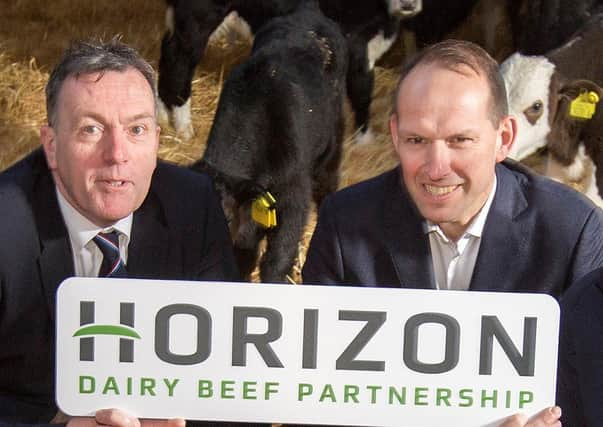Support ‘call for evidence’ - UFU


UFU deputy president David Brown said: “Lord Dehen chair of the UK Climate Change Committee (CCC) outlined that it was ‘morally wrong’, scientifically impossible and unachievable for NI to hit net zero before 2050 based on relevant evidence. What is most concerning is that even with these direct statements from the CCC experts, our politicians and the environmental lobby are still not listening.
“Understanding the unique position of NI, the CCC committee recommended reducing emissions here by 82 percent by 2050. However, Lord Deben assured that even this target is a very ‘tough demand’ which would require major change and hard work particularly for the farming community. We’re not to be misled into thinking it’s a smaller request nor is it ‘a hopeful wish list figure’. This will require changes on farms across NI and we need to be prepared for that but at least analysis has been done unlike with the Private Member’s Bill position.
Advertisement
Advertisement
“With the climate change bill tabled by Green Party leader Claire Bailey MLA undergoing Assembly scrutiny, we must continue to make the case for a fairer framework. One that is backed up with expert advice relevant to NI and allows our local farmers to reduce emissions on farm without drastic livestock reductions while allowing them to continue to feed the nation. At the present time, this bill does none of these things and the AERA committee’s call for evidence is a crucial part of achieving essential revisions.


“The AERA committee is asking all stakeholders to express their views on the bill’s targets and proposals, and the impact they will have. Exporting our agri food industry overseas is a major concern about this bill, especially when our emissions are less than half of the world average.
“I urge our members to respond to the call for evidence. Everyone’s input is crucial to protecting our family farms across NI and the future of our agri food industry.”
Meanwhile, it was announced on Thursday evening that Agriculture Minister Edwin Poots’ draft climate change bill has been supported by his executive colleagues.
Advertisement
Advertisement
Mr Brown said: “The UFU welcome the news that the draft climate change bill put forward by the Agriculture Minister is undergoing a consultative process and will be pushed on to complete its legislative passage within the current Assembly mandate. While the UFU still need to fully consider the framework of this draft bill, it’s already proving to be more realistic. It clearly demonstrates that the advice of the CCC has been taken on board by proposing an ‘ambitious but achievable target’ of reaching at least 82 percent reductions in greenhouse gas emissions in NI by 2050 - minus the threat of wiping out our agri food industry in the process unlike the Private Member’s Bill.
“Action is needed from NI and our farmers are committed to combatting climate change especially when it impacts them so significantly on a daily basis, but targets need to be sensible and MLAs must listen to the expert advice that is relevant to NI. Our political leaders followed expert advice when it came to COVID-19, why should it be any different for climate change? Following recommendations is vital to ensuring our NI agriculture industry has a future and we all must make it a priority to stress these concerns in the call for evidence,” said Mr Brown.
Next week, the UFU will be giving oral evidence to the AERA Committee on the climate change bill. Members are encouraged to submit their responses to the AERA committee’s call for evidence by 15 July. The UFU will be emailing more information to members in the coming days, regarding how to do this.
Meanwhile, the beef sector is indicating that climate change can provide opportunities for livestock farmers in Northern Ireland.
Advertisement
Advertisement
The current output of Northern Ireland’s beef industry at farm level is currently valued at around £450m per annum: we produce just short of 150,000t of beef annually.
ABP’s Managing Director in Northern Ireland’s George Mullan believes that the beef sector can retain this level of output while still meeting its climate change commitments.
He explained: “We now know that the attainment of improved breeding performance, enhanced animal health levels, better grassland management practises and more targeted feeding regimes can help to deliver significant reductions in the beef industry’s carbon footprint.
“Given what we already know now, it will be possible to significantly reduce the time taken to bring cattle through to finished weights. Current estimates indicate that the beef sector can easily secure a 35 to 40% reduction in greenhouse gas emissions within the next decade.”
Advertisement
Advertisement
He added: “There is little doubt that additional scientific research will get us the rest of the way in helping to meet Northern Ireland’s carbon net zero commitments over the following decades.”
But George Mullan also made it clear that the beef industry has no alternative but to address the challenge of climate change in a very forthright manner.
He explained: “Retailers and all those other customers that we deal with have committed to securing these very same net carbon zero targets. And to make this happen requires every facet of the beef production and supply chain to be operating from the same page, where climate action is concerned.
“But the good news for farmers and the economy as a whole is that the beef industry can meet its climate change targets without reducing cattle numbers.”